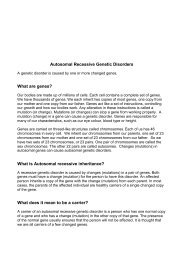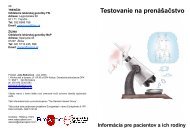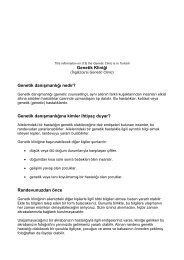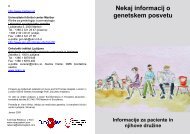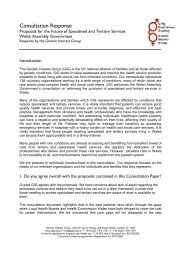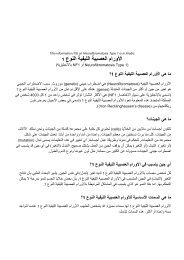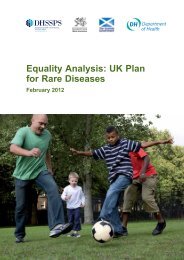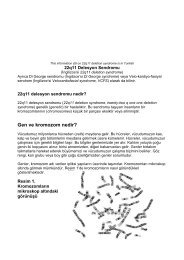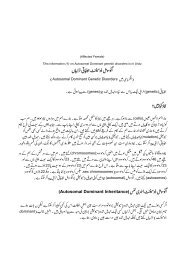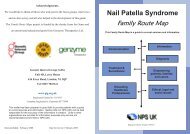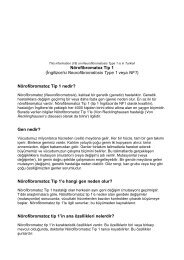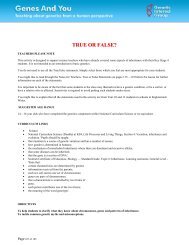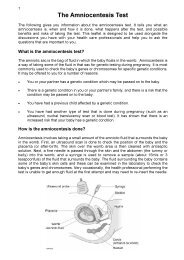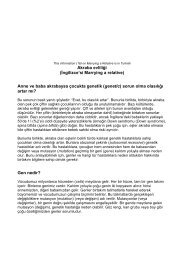FAQ on Biobanks - Genetic Alliance UK
FAQ on Biobanks - Genetic Alliance UK
FAQ on Biobanks - Genetic Alliance UK
Create successful ePaper yourself
Turn your PDF publications into a flip-book with our unique Google optimized e-Paper software.
11. Can the d<strong>on</strong>or withdraw from a biobank after<br />
having joined <strong>on</strong>e?<br />
The right to withdraw, the implicati<strong>on</strong>s of such withdrawal and any limitati<strong>on</strong>s (for example<br />
with regard to uses of samples or data prior to withdrawal) should be fully explained when<br />
the d<strong>on</strong>or c<strong>on</strong>sents to provide a sample for a biobank. If samples have been an<strong>on</strong>ymized<br />
a withdrawal is no l<strong>on</strong>ger possible. Withdrawal would <strong>on</strong>ly be possible as l<strong>on</strong>g as the<br />
an<strong>on</strong>ymizati<strong>on</strong> process has not taken place.<br />
In all other circumstances (coded, double-coded samples) a withdrawal of both specimen<br />
and data for future use is possible at any time up<strong>on</strong> the participant’s request. All future<br />
analyses will then be carried out without using this sample. Analyses already completed will<br />
not be modified (i.e. c<strong>on</strong>tinue to c<strong>on</strong>tain the participant’s informati<strong>on</strong> as part of the overall<br />
result).<br />
12. How l<strong>on</strong>g are biobanks set up to run for?<br />
The life of the biobank depends <strong>on</strong> its intended use, and is generally specified in both the<br />
research proposal that is approved by ethical review and in the Informed C<strong>on</strong>sent. Some<br />
samples that are collected for a very specific purpose may <strong>on</strong>ly be kept until this purpose<br />
has been achieved; others are collected for l<strong>on</strong>ger-term storage, for a period of say 10, 15, 30<br />
years, or l<strong>on</strong>ger. Once the decisi<strong>on</strong> is made to remove samples from the biobank, they are<br />
destroyed, whereas data may c<strong>on</strong>tinue to be retained. In some countries legislati<strong>on</strong> exists to<br />
c<strong>on</strong>trol the period of time that samples and data can be stored.<br />
13. What happens when they close down?<br />
If a biobank was created for a specific purpose that is no l<strong>on</strong>ger relevant, or if the<br />
establishment hosting the biobank closes, then the samples stored in the biobank should<br />
normally be destroyed. It is c<strong>on</strong>ceivable that the samples would be transferred to another<br />
host organisati<strong>on</strong>. In that case, the accepting organisati<strong>on</strong> must c<strong>on</strong>tinue to protect the<br />
integrity of the samples and to ensure that they comply with the terms of the c<strong>on</strong>sent given<br />
by the original sample d<strong>on</strong>ors.<br />
14. Can a d<strong>on</strong>or say no to particular types of<br />
research?<br />
Specific questi<strong>on</strong>s like this need to be discussed before c<strong>on</strong>senting to d<strong>on</strong>ate a sample to a<br />
biobank, but it is likely that respecting such individual requests will be too complex for the<br />
biobank. It will therefore usually mean that participating d<strong>on</strong>ors wanting to restrict the use of<br />
their samples are not c<strong>on</strong>sidered at all.<br />
<str<strong>on</strong>g>FAQ</str<strong>on</strong>g> <strong>on</strong> <strong>Biobanks</strong><br />
15



